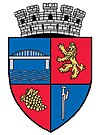Medgidia
| Medgidia | ||
|---|---|---|
| Municipality | ||

Medgidia railway station
|
||
|
||
 Location of Medgidia |
||
| Coordinates: 44°15′01″N 28°15′41″E / 44.25028°N 28.26139°ECoordinates: 44°15′01″N 28°15′41″E / 44.25028°N 28.26139°E | ||
| County | Constanța County | |
| Status | Municipality | |
| Component villages | Remus Opreanu, Valea Dacilor | |
| Government | ||
| • Mayor | Valentin Vrabie (Independent) | |
| Area | ||
| • Total | 90.17 km2 (34.81 sq mi) | |
| Population (2011) | ||
| • Total |
|
|
| Time zone | EET (UTC+2) | |
| • Summer (DST) | EEST (UTC+3) | |
| Climate | Cfa | |
| Website | http://www.emedgidia.ro/ | |
Medgidia (Romanian pronunciation: [med͡ʒiˈdi.a] or [med.d͡ʒiˈdi.a]; historical Turkish names: Karasu or Carasu, Mecidiye or Megidie) is a city in Constanța County, Dobruja, south-eastern Romania.
Archaeological findings show that Dobruja was inhabited since the Neolithic period. Starting with 46 BC the region was administered by the Roman Empire. A castrum was built in the Carasu Valley, becoming the cradle of the settlement.
In 1417, the Turks invaded Dobruja. From the 15th century onwards the region started to be colonized with Muslim population. The settlement named "Karasu" (Turkish for "Black Water") was mentioned on the map of Iehuda ben Zara in 1497, in the notes of Paolo Giorgio (1590) and Evliya Çelebi (1653).
Modern Medgidia was built by the Ottoman administration on the place of the old Karasu beginning with 1856. It was built as a planned city to accommodate refugees from the Crimean War and to serve as an economic hub for the central zone of Dobruja. The town was named in honour of the sultan Abdülmecid I, the Ottoman sovereign of the period.
After the Russo-Turkish War (1877–1878), Northern Dobruja became part of Romania.
Medgidia is located between the Danube and the Black Sea, just 39 kilometres away from Constanța.
...
Wikipedia

